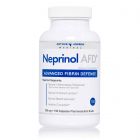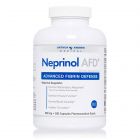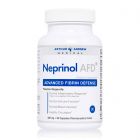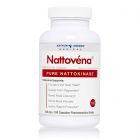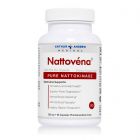The usefulness of orthomolecular therapy: interview Sophie Meurs
- By Geertje (Gre) Haak
- 17 Oct 2020


Orthomolecular therapy is often dismissed as pseudoscience, but is this justified? After all, the knowledge on which the therapy is based is scientific. I also hear a lot of positive feedback about this alternative medicine, not only on the internet and social media, but also from family and friends. Last week I spoke with Sophie Meurs - dietician, orthomolecular therapist and intestinal therapist - about the usefulness of (preventive) orthomolecular therapy and the importance of healthy intestines.
After Sophie graduated from Nutrition & Dietetics at HVA, she followed several follow-up courses, including orthomolecular therapy and bowel therapy. This was no coincidence. Sophie herself had intestinal complaints at the age of 19, which at the time were labeled IBS. This is how she came into contact with orthomolecular therapy. A career choice that arose from her own experience, I think that's a great thing.
Can you briefly explain what orthomolecular therapy entails?
"Orthomolecular therapy is concerned with the biochemistry of the body. This means looking at which molecules are good for the body. Consider, for example, micronutrients, trace elements and minerals. I usually get these insights on the basis of a blood test, looking at the specific needs of the client. However, this depends on the intake, which can also give such a clear cause that testing is not always necessary. For example, when someone works out a lot, a magnesium deficiency can be an obvious cause. In most cases, a blood test is desirable."
 For whom may orthomolecular therapy be a solution?
For whom may orthomolecular therapy be a solution?
"Especially for people with complaints that are not taken seriously. A good example is Irritable Bowel Syndrome. A FODMAP diet is often recommended. Various foods are removed from the diet, after which they are slowly added again. The disadvantage is that you miss a lot of good nutrients."
"As a therapist, I am in favor of investigating intolerances that may be the cause of the complaints. Consider, for example, gluten or dairy (lactose and / or casein) intolerance. Mapping certain triggers in our system can explain certain, sometimes vague, complaints."
With which complaints do most of your clients come to you?
"Mainly with intestinal complaints such as bloating and IBS. These are often vague complaints caused by food intolerances, this can be traced back to the research. However, it is also increasingly common for someone to want to have his or her vitamin status tested to gain insight into the system. People also come to me to lose or gain weight. People with thyroid problems, but also people with PCOS. Because I mainly guide people in adjusting their diet, anyone who wants to get started with their nutrition can contact me."
How did you come into contact with orthomolecular therapy yourself?
"When I was 19, I started to suffer from intestinal complaints. This is one of the most misunderstood complaints in regular healthcare. I was sent home with the stamp "IBS" and you have to do it instinctively. As a result, I started to do my own medicine. In my search for relief from my complaints, I came into contact with orthomolecular therapy. This would change my life. Due to changes in my diet and the use of supplements, I have been completely free of complaints ever since. It has also had a tremendous positive effect on my asthma."
What was the reason that you opted for a deepening in orthomolecular therapy after your study Nutrition & amp; Dietetics at the AUAS?
"During the training I got the feeling that I had not made the right choice. I was not sure whether what I was learning suited me or whether I wanted to share it. Dietetics is mainly aimed at tackling clinical pictures and that seemed to me to be the opposite world. "Why is a nutritional plan not used preventively to avoid many problems?" I wondered."
"When I was looking for an internship company, I consciously chose an orthomolecular practice because I myself had benefited greatly from this therapy. During my internship everything fell into place, I wanted to make a difference in the early stages of illness, preventively. It became clear to me that my feeling was correct, I can support clients optimally, without them being ill."
You have also followed a training as a bowel therapist, what exactly does this entail?
"During the training as a gut therapist you learn, among other things, what the intestinal flora - called gut microbiome - looks like and which good and bad bacteria can be found in the intestines. Bowel therapy is aimed at resolving inflammation and histamine intolerances in the gut that cause complaints. Parasites, fungi and yeasts can be a cause of this."
What is a bowel therapy treatment plan and how do you implement it?
"Usually a therapy plan is drawn up based on diet and lifestyle changes in combination with supplements. However, I have chosen to support my clients from the ground up in terms of nutrition and lifestyle. This makes the treatment less complex. In this way I hope to relieve the complaints and support the health of my client. If this does not appear to be a solution for the complaints, the client can still go on to a bowel therapist. I include the knowledge and experience I have gained in my treatments, but my focus is not on bowel therapy by conducting stool examinations."
After the intake interview, you often have your clients take a blood test, what is the reason for this?
"To map food reactions and intolerances, to determine the vitamin status, but also to map out the hormone levels, the latter is done via a saliva test instead of a blood test."
How do you make use of the knowledge you have within your own lifestyle?
"I had IBS-related complaints until I was 24. At the time, I adjusted my diet based on research into food reactions, vitamin status and stool research. By avoiding stress and following a balanced diet, I have been completely free of complaints ever since."
What tip would you like to give everyone when it comes to health?
"Stress is really health killer number 1 because it always takes precedence over other functions in the body. The stress hormone cortisol causes many complaints. So try to avoid stress as much as possible, is my motto!"
Questions or do you want to make an appointment?
Do you have questions, or are you curious about what Sophie could do for you? Which she can! On her website nourishtoflourish.nl you will find more information about her services.







